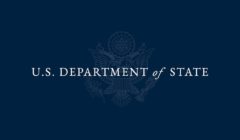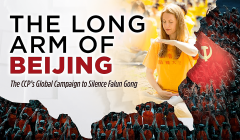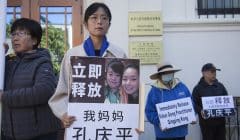How China Leads a Campaign of Censorship and Intimidation Throughout the West (excerpt)
Russia may get the headlines, but China's reach is enough to make Moscow envious
By Casey Michel, ThinkProgress.org | Jan 10, 2018

For the past few years, one foreign government, an autocratic adversary in all but name, has jailed the families of American journalists, unleashed hackers and social media trolls by the tens of thousands, and injected a campaign to silence critics throughout the West, forcing publishers to back down and convincing American academic institutions to look the other way.
This dictatorship, building a police state and cult of personality at home, has attempted to export its one-party model abroad, attracting autocrats and smothering liberal democrats at every turn – all while, if recent photo ops are anything to go by, finding a sympathetic ear in the White House.
This dictatorship, however, isn’t Russia.
It’s China.
From imprisoning spouses and siblings of American journalists to littering American academia with pro-Beijing institutes, China has led a campaign of influence and intimidation in the West that has outpaced Russia at nearly every turn. While there are no signs Beijing attempted to meddle in the recent American election to the extent Moscow did, Chinese officials have nonetheless exerted a campaign of subterfuge throughout Europe, the Americas, and Australia and New Zealand. The aim of the campaign is ending criticism wherever it may be found, and expanding China’s autocratic diktat wherever it can.
…
Three years ago, Chinese authorities began arresting family members of Shohret Hoshur, an American journalist with Radio Free Asia. Hoshur’s coverage of China’s presence in Xinjiang, a colonial outpost along China’s western reaches – and a testing ground for Beijing’s most illiberal surveillance and police tactics against the country’s Muslim minority – tweaked Chinese authorities, who proceeded to arrest a trio of Hoshur’s brothers in retaliation for his coverage.
A spokesperson for Radio Free Asia told ThinkProgress that two of Hoshur’s brothers have since been released, but that one remains in prison. Numerous other employees of Radio Free Asia have also seen their families harassed, with certain male relatives “detained and put in re-education camps,” according to the spokesperson.
But Radio Free Asia isn’t the only outlet with American employees whose families have been targeted. Another American reporter, Chen Xiaoping – who had recently interviewed one of China’s most well-known dissidents – revealed this week that his wife has remained under police detention for months.
…
Schooled in silence
Unfortunately, Guo is by no means the lone opposition voice China has attempted to silence on American soil. A recent op-ed from Wang Dan, a Chinese dissident who helped lead the Tiananmen Square protests nearly 30 years ago, described how the “Chinese Communist Party is extending its surveillance of critics abroad, reaching into Western academic communities and silencing visiting Chinese students. Through a campaign of fear and intimidation, Beijing is hindering free speech in the United States and in other Western countries.”
Tactics include recruiting Chinese students in Western institutes to monitor other Chinese students expressing views critical of Beijing, or even those simply “seen with political dissidents” like Wang, with family members in China subsequently threatened or abducted. Other students in the U.S. critical of Beijing have faced hacking campaigns originating in China. Due to the surveillance, Chinese students in Australia have begun requesting tutorial classes without other Chinese students.
…
Elsewhere, China’s Confucius Institutes, attached to dozens of universities across the U.S. – and hundreds of more abroad – have gained renewed attention for their pro-Chinese Communist Party slant, cowing school officials and pushing Beijing-friendly messaging throughout academia. Given that these Confucius Institutes are run out of official Chinese government agencies, they are, as The New York Review of Books’ Richard Bernstein wrote earlier this year, “often … set up in secretive agreements with host institutions, which has caused Western scholars to question whether their universities are ceding undue control to a foreign government – in this instance, a foreign government well known for aggressively propagandizing its official views, censoring dissenting opinions, and imprisoning those who express them.”
Not only has Beijing pressured those working out of the Confucius Institutes to toe the state’s line on controversial topics, ranging from Tibet to Taiwan to Tiananmen, but they also appear to bar members of the Falun Gong, a religious sect facing heavy persecution in China, from working, a clear violation of proscriptions against religious discrimination in the U.S. A report from the National Endowment for Democracy this month even found that taxpayers in numerous democracies fund these Confucius Institutes, helping subsidize China’s state line on any number of topics.
…
“I’d say this to the United States: There’s been a great emphasis on Russia, but in fact the real danger is China,” Australian Charles Sturt University’s Clive Hamilton added. “China’s economy is eleven times bigger than Russia’s. … It has deep business and financial links in the United States, it has a bigger diaspora in the United States. Really, that’s where the focus should be.”








